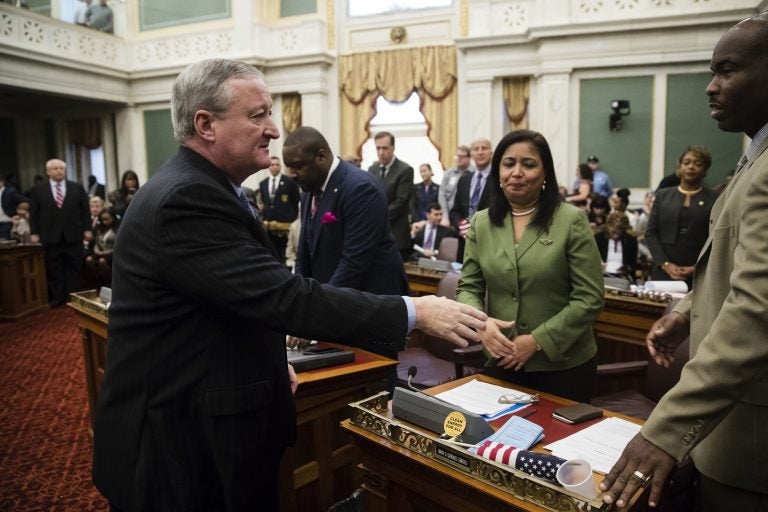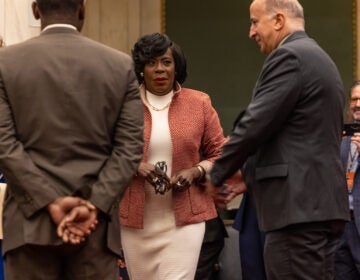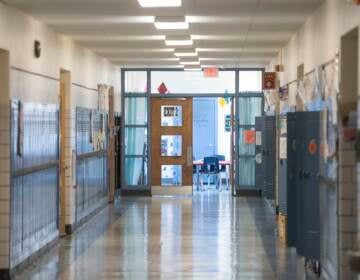Amid resounding cheers, Kenney leads city charge to reclaim control of Philly schools
Listen 5:24
Philadelphia Mayor Jim Kenney, left, shakes hands with members of City Council after speaking at City Hall in Philadelphia. Kenney on Nov. 2 called for the panel that governs the city's schools to be dissolved and replaced by a mayor-appointed board. (Matt Rourke/AP Photo)
In a landmark speech delivered Thursday before City Council, Philadelphia Mayor Jim Kenney said the city should reclaim control of its schools as a means to spur growth and curb poverty.
Kenney’s speech marks the near-certain demise of Philadelphia’s School Reform Commission, a 16-year experiment in state control over Pennsylvania’s largest school system.
“Again and again we’ve told the people of Philadelphia that the state of their schools are someone else’s responsibility,” he said. “That ends today.”
Kenney foresees a city board of nine members that he will appoint with City Council’s approval.
The SRC still must vote to dissolve itself for this transition to happen, but officials are confident the five-member commission will do so at its next meeting on Nov. 16. Under the current timeline, the proposed local school board will assume power on July 1.
For weeks, insiders expected Kenney to announce his support for local control and lay out a plan to replace the SRC. More telling was the conviction with which Kenney argued for local accountability and a locally funded solution to the district’s yawning structural deficit.
“If we don’t take responsibility for the fate of our schools then we will continue to relegate generations of Philadelphia families to poverty,” Kenney said. “I am not willing to do that.”
After three years of budget surpluses, the district will swing back into the red in fiscal year 2019. According to the most recent district projections, that deficit will reach nearly a billion dollars by fiscal year 2022 without new revenue.
The district endured rounds of painful budget cuts starting around 2012, and Kenney vowed not to repeat that destabilizing scenario. Because Pennsylvania is dealing with its own budget woes, Kenney said, it will be the city’s responsibility to meet the district’s needs.
“That’s the reality,” Kenney said. “To say otherwise would only push off the responsibility we all say we want with local control. So the final plan we propose to meet the district needs will be difficult. And it will require everyone to pitch in. But the alternative is far worse.”
That alternative, Kenney forecast, is a crumbling public system that can’t attract families — and a city whose recent revival will quickly morph back into decline.
“Philadelphia will slowly but surely fail,” Kenney said. “That’s a dark prediction, but it’s an accurate one. Our schools are the key to reducing our poverty rate. Education is the only way out.”
Financial details obscure
Kenney did not, however, detail how the city will plug the school district’s impending deficit. He mentioned that he did not believe collecting delinquent taxes or soliciting payment from tax-exempt nonprofits would be sufficient.
He did not mention taxes in his speech, but he said his administration is working on a proposal that will help the district balance its books.
“Help from the commonwealth is not coming,” Kenney said. “It’s not coming.”
By contrast, Council President Darrell Clarke, in his post-speech remarks, said he wanted to make it “very clear” that state lawmakers still had a duty to properly fund Philadelphia schools.
“Local control, as it relates to governance, does not mean only local funding,” Clarke said. “The state still has its constitutional mandate as it relates to funding public education.”
Clarke would not say if he was open to raising city taxes to fund Philadelphia’s school system, which has a structural imbalance fueled by rising charter and pension costs.
“I never answer a question about taxes until I have to vote,” Clarke said. “There is a process.”
Councilwoman Maria Quiñones-Sánchez, however, said “everything” is on the table when it comes to raising new revenue.
“The mayor laid out a vision for local control,” she said. “He did not put forward a plan for how he’s going to finance it. So we look forward to that conversation.”
Kenney made clear that this move toward local control makes him — and all future mayors — chiefly responsible for the fate of Philadelphia’s public schools. For most of the years prior to the SRC, school board members served staggered terms that made it difficult for any one mayor to dictate policy.
Kenney will have more power than arguably any mayor in Philadelphia’s history over the direction of the city’s public schools. Quiñones-Sánchez said the mayor has now “stuck his whole political equity behind” public education.
Move applauded
The early returns are at least encouraging. Kenney received several rousing ovations during his speech, and his remarks were well received across the local education landscape.
Kenney talked specifically about quelling debate between traditional public schools and charter schools, a line that drew plaudits from those in the school choice community.
“He said that he would judge by the quality of the school regardless of what sector they came out of,” said David Hardy, founder of Boys Latin charter school. “I’m very comfortable with that.”
Scott Gordon, CEO of Mastery Charter Schools, echoed those sentiments in a statement.
“Mastery Charter Schools applauds Mayor Kenney for having the vision to take full responsibility and accountability for moving public education forward in Philadelphia,” Gordon said. “We enthusiastically support his commitment to ensure every child has choice and access to quality schools – district or charter – no matter where they live and no matter what they look like.’”
Gov. Tom Wolf called Kenney’s speech “an important step forward.”
The governor “has long supported Philadelphia residents — and not Harrisburg politicians — having control of local schools,” according to a statement from Wolf’s office.
Pennsylvania Secretary of Education Pedro Rivera would have to certify the SRC’s decision to dissolve itself for the action to become official. That appears highly likely.
When it came to education policy, Kenney threw his support behind many of the initiatives Superintendent William Hite has championed. He referenced, for instance, the importance of early literacy, a particular focus of Hite’s.
“Dr. Hite has helped our students succeed, even while dealing with very difficult resource challenges,” Kenney said.
One of Hite’s current bosses, SRC chair Joyce Wilkerson, also praised Kenney’s speech and confirmed that the commission will vote Nov. 16 on whether to dissolve.
“Strong public education is the most significant factor in the welfare of our city and the future of our children,” Wilkerson said. “It is time for Philadelphia to take ownership of that future.”
If there was any hesitation Thursday, it was from the very activists who’ve championed local control. While many celebrated the SRC’s demise, they lamented Kenney’s refusal to support the formation of a locally elected school board. Every Pennsylvania school district except Philadelphia’s has an elected board.
Parent Kendra Brooks, a member of the Our City Our Schools coalition, which organized around ending the SRC, said she was “really excited” by Kenney’s speech, but would continue to press for an elected board.
“Just like we had to fight for this, the fight is never over,” Brooks said.
WHYY is your source for fact-based, in-depth journalism and information. As a nonprofit organization, we rely on financial support from readers like you. Please give today.





